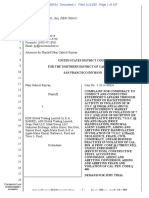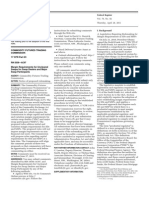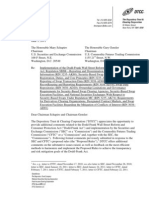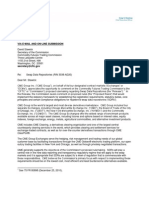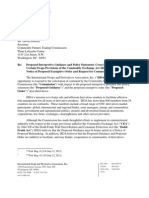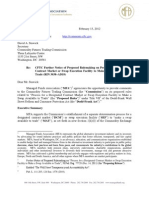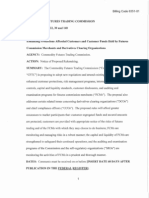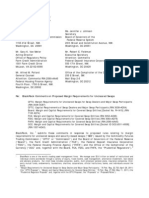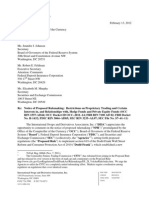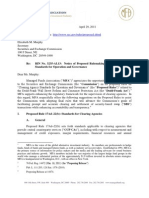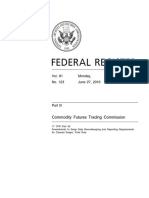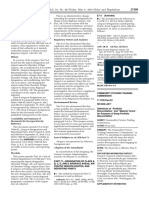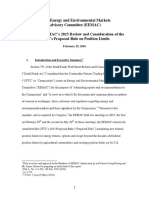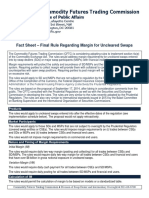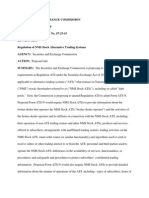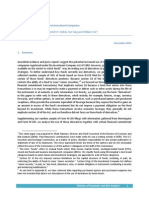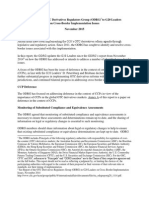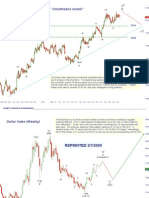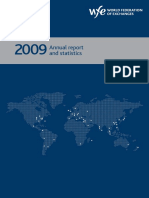Professional Documents
Culture Documents
55 Water Street NEW YORK, NY 10041-0099 TEL: 212-855-3240
55 Water Street NEW YORK, NY 10041-0099 TEL: 212-855-3240
Uploaded by
MarketsWikiOriginal Description:
Original Title
Copyright
Available Formats
Share this document
Did you find this document useful?
Is this content inappropriate?
Report this DocumentCopyright:
Available Formats
55 Water Street NEW YORK, NY 10041-0099 TEL: 212-855-3240
55 Water Street NEW YORK, NY 10041-0099 TEL: 212-855-3240
Uploaded by
MarketsWikiCopyright:
Available Formats
55 WATER STREET NEW YORK, NY 10041-0099 TEL: 212-855-3240 lthompson@dtcc.
com
June 6, 2012 David A. Stawick Secretary of the Commission U.S. Commodity Futures Trading Commission Three Lafayette Centre 1155 21st Street, N.W. Washington, D.C. 20581 Re: Swap Data Repositories: Interpretative Statement Regarding the Confidentiality and Indemnification Provisions of Section 21(d) of the Commodity Exchange Act (RIN 3038AD83) Dear Mr. Stawick: The Depository Trust & Clearing Corporation (DTCC) appreciates the opportunity to comment on, and provide specific modifications to, the Commodity Futures Trading Commissions (CFTC or Commission) interpretative statement providing guidance on the applicability of the confidentiality and indemnification provisions set forth in new section 21(d) of the Commodity Exchange Act (CEA) added by section 728 of the Dodd-Frank Wall Street Reform and Consumer Protection Act (Dodd-Frank Act) (the Interpretative Statement).1 DTCC has worked closely with Congress and federal regulators to ensure that the financial regulatory reforms implemented in connection with the Dodd-Frank Act serve to reduce risk, increase transparency and promote market integrity within the financial system.2 The Dodd-Frank Acts Title VII indemnification provisions create significant problems with the ability to ensure effective swap transaction data sharing between regulators globally and in the United States. 3
See Swap Data Repositories: Interpretative Statement Regarding the Confidentiality and Indemnification Provisions of Section 21(d) of the Commodity Exchange Act, 77 Fed. Reg. 26,709 (May 7, 2012). Notably, two DTCC subsidiaries have applied, pursuant to the Commissions Part 49 rules, to operate swap data repositories (SDRs): DTCC Data Repository (U.S.) LLC; and the Global Trade Repository for Commodities (U.S.) LLC, a U.S.-based entity intended to be an SDR for all commodities. The provisions are implemented pursuant to CEA section 21(d) and Securities Exchange Act of 1934 section 13(n)(5)(H), as amended by Dodd-Frank Act 728 and 763, respectively (the Indemnification Provisions).
3 2 1
Mr. David A. Stawick June 6, 2012 Page 2 of 5
Limitations of the Interpretative Statement DTCC appreciates the Commissions serious effort to address these problems in the context of its rulemaking authority. However, due to the limitations inherent in a regulatory modification to a statutory problem, and in light of discussions with regulators globally, the language of the statute ultimately requires a legislative fix to clarify the scope and applicability of CEA section 21(d)s confidentiality and indemnification provisions. In previous comment letters and through ongoing dialogue with the Commission, DTCC has consistently expressed concerns that the Indemnification Provisions threaten to undermine global data sharing among regulators by operating to prevent or inhibit foreign regulatory authorities from accessing data maintained by SDRs, leading to the fragmentation of a global data set into multiple, unaggregated entities. While the Interpretative Statement provides clarification with respect to how the Commission proposes to construe the application of CEA section 21(d), it does not provide complete resolution to the concerns expressed by foreign regulatory authorities relating to regulator access. Even with adoption of the Interpretative Statement, which DTCC supports as a necessary first step, the Indemnification Provisions may still cause limited data sharing across jurisdictions. Many regulators globally have expressed to DTCC the belief that a legislative resolution is needed to address the issues presented by the Indemnification Provisions. The continued presence of the indemnification requirement (even as modified by the proposed Interpretative Statement) is viewed as a significant barrier to the ability of regulators globally to effectively utilize the transparency offered by a trade repository registered in the U.S. For example, foreign regulators have noted concerns with a scenario in which a foreign regulator has an interest in certain data in a U.S. SDR resulting from a jurisdictional nexus with respect to the currency or underlying reference entity, where neither party to the transaction falls under the foreign regulators oversight authority. For example, a U.S. and a London-based bank may trade on an equity swap involving a Japanese underlying entity, and the trade is reported to a U.S. SDR. If the Japan Financial Services Agency has an interest in accessing such data, it does not appear to be able to do so absent a confidentiality and indemnity agreement. Additionally, DTCC suggests that the Interpretative Statement support SDRs receiving data for non-Dodd-Frank Act purposes without being subject to the mandate of the Indemnification Provisions. For example, the industry has expressed a strong desire in leveraging the existing SDR infrastructure (as an agent or thirdparty service) to meet reporting obligations elsewhere while using a consistent and uniform reporting template. Since this data would be reported to assist firms with additional reporting obligations, the voluntary reporting of non-Dodd-Frank Act data should not be subject to the Indemnification Provisions.
Mr. David A. Stawick June 6, 2012 Page 3 of 5
Because of the limitations of the CFTCs Interpretative Statement, U.S.-based SDRs may have difficulty providing market data to third-party regulatory authorities. In turn, the difficulty of sharing data may cause foreign regulators to establish their own national repositories to ensure access to data. Even with the Interpretative Statement, there is little benefit in sharing with a U.S. SDR, as it does not extend data access and would tend to narrow to data reported pursuant to specific regulation, while adding the apparent complexity of dual regulation. A proliferation of national repositories would result in the fragmentation of a single global data set into multiple local ones, providing regulators an incomplete picture of critical market data. Such a result runs counter to the important Dodd-Frank Act goals of enhancing transparency, promoting standardization and reducing systemic risk. Need for Interim Solution DTCC recognizes that considerable time may lapse before Congress can complete action on the appropriate legislation to resolve this problem and, therefore, a workable interim solution is required. To that end, the CFTCs interpretative relief is welcome. However, the Interpretative Statement should be modified to provide clarity and assurance to both registered SDRs and foreign regulators to ensure the effective sharing of critical swap transaction data on a global basis. These modifications will promote the ability of non-U.S. regulators to access critical information needed to conduct timely and effective market and systemic risk. With respect to section III.A. of the Commissions Interpretative Statement addressing data reported to registered SDRs, the Commission indicates that a registered SDR will not be subject to the confidentiality and indemnification provisions of CEA section 21(d) if (1) the registered SDR is also registered, recognized or otherwise authorized in a foreign jurisdictions regulatory regime; and (2) the data sought to be accessed by a foreign regulatory authority has been reported to such registered SDR pursuant to the foreign jurisdictions regulatory regime.4 DTCC encourages the Commission to clarify that the otherwise authorized in a foreign jurisdictions regulatory regime provision also applies to a regulator with oversight responsibilities conferred under its jurisdictions laws or regulations over specific entities or entity types without requiring registration or licensing of the SDR. Further, SDRs operating in accordance with the principles for trade repositories set forth in the Committee on Payment and Settlement Systems (CPSS) and the Technical Committee of the International Organization of Securities Commissions (IOSCO) report on Principles for financial market infrastructures should be deemed authorized to provide such data in the foreign jurisdictions regulatory regime.5 The CPSS-IOSCO principles provide internationally agreed upon standards for the operation of financial market infrastructures, including trade
4 5
See Interpretative Statement, 77 Fed. Reg. at 26,712.
See CPSS-IOSCP Principles for financial market infrastructures (Apr. 2012); available at http://www.iosco.org/library/pubdocs/pdf/IOSCOPD377.pdf.
Mr. David A. Stawick June 6, 2012 Page 4 of 5
repositories, and adherence to such standards should provide the requisite structure for the sound operation of a trade repository in disclosing data to a foreign regulatory regime. The Commission should consider changing the Interpretative Statement to specifically provide that, for purposes of identifying data reported pursuant to the foreign jurisdictions regulatory regime, a foreign regulatory regime includes a foreign jurisdictions adherence to those principles outlined for market regulators with respect to the oversight, supervision and regulation of financial market infrastructures, including trade repositories, as detailed by the CPSS-IOSCO report on Principles for financial market infrastructures.6 The CPSS-IOSCO principles outlined for market regulators promote trade repository oversight, supervision and regulation in a manner consistent with international standards outlined by the CPSSIOSCO report. Regarding section III.B. of the Commissions Interpretative Statement addressing foreign regulatory access to data held in registered SDRs, the Commission proposes that a foreign regulators access to data from a registered SDR will be dictated by that foreign jurisdictions regulatory regime (not the CEA or the Commissions regulations) where the registered SDR is also registered, recognized or otherwise authorized in the foreign jurisdictions regulatory regime and the data to be accessed has been reported pursuant to that regulatory regime. DTCC encourages the Commission to clarify section III.B. of the Interpretative Statement consistent with the approach advocated above with respect to section III.A; specifically, by elaborating on the scope of the meaning of (1) otherwise authorized in a foreign jurisdictions regulatory regime; and (2) pursuant to the foreign jurisdictions regulatory regime. DTCC notes the Commissions footnote7 regarding direct electronic access to swap data reported to an SDR pursuant to CEA section 21 and the Commissions regulations. DTCC believes the Commissions explanatory comments will positively assist in alleviating certain foreign regulators concerns regarding plenary access by affirming that the Commissions direct electronic access to data will be limited to that data reported pursuant to the Commissions jurisdiction in accordance with CEA section 21 and the promulgating regulations. Commission Support for Legislative Repeal In written testimony before the House Financial Services Committee in support of legislation (H.R. 4325) to remove the Indemnification Provisions from the DoddFrank Act, the U.S. Securities and Exchange Commission (SEC) indicated that it is seriously troubled by the statements of certain foreign regulators about their intention to adopt reciprocal indemnification requirements, such that U.S. regulators would have to provide written indemnification agreements to foreign trade
6 7
See id. See Interpretative Statement, 77 Fed. Reg. at 26,712-13, fn. 34.
Mr. David A. Stawick June 6, 2012 Page 5 of 5
repositories as a precondition for accessing data, or otherwise block access by U.S. regulators to foreign trade repositories..[t]he SEC would be legally unable to meet any such indemnification requirement and has argued vigorously against similar requirements in other contexts.8 The SEC explicitly recommended that Congress consider removing the indemnification requirement added by the Dodd-Frank Act.9 It would be a positive signal to regulators globally for the Commission to join the SEC in publicly supporting repeal of the Indemnification Provisions. Conclusion DTCC greatly appreciates the opportunity to offer these comments on the Interpretative Statement. Should the Commissions wish to discuss these comments further, please contact me at 212-855-3240 or lthompson@dtcc.com. Sincerely yours,
Larry E. Thompson General Counsel
Written Testimony of Ethiopis Tafara, House Financial Services Subcommittee on Capital Markets and Government Sponsored Enterprises (Mar. 21, 2012), available at http://financialservices.house.gov/UploadedFiles/HHRG-112-BA-WState-ETafara-20120321.pdf.
9 8
Id.
You might also like
- BitMEX Ravzan Complaint As FiledDocument197 pagesBitMEX Ravzan Complaint As FiledForkLogNo ratings yet
- Proposed Rules: I. BackgroundDocument18 pagesProposed Rules: I. BackgroundMarketsWikiNo ratings yet
- Federal Register / Vol. 77, No. 9 / Friday, January 13, 2012 / Rules and RegulationsDocument89 pagesFederal Register / Vol. 77, No. 9 / Friday, January 13, 2012 / Rules and RegulationsMarketsWikiNo ratings yet
- 55 Water Street NEW YORK, NY 10041-0099 TEL: 212-855-3240: Available atDocument35 pages55 Water Street NEW YORK, NY 10041-0099 TEL: 212-855-3240: Available atMarketsWikiNo ratings yet
- Swaps") Across Regions and Asset Classes, As Well As Universal Middleware Connectivity For DownstreamDocument6 pagesSwaps") Across Regions and Asset Classes, As Well As Universal Middleware Connectivity For DownstreamMarketsWikiNo ratings yet
- Federal Register / Vol. 76, No. 170 / Thursday, September 1, 2011 / Rules and RegulationsDocument60 pagesFederal Register / Vol. 76, No. 170 / Thursday, September 1, 2011 / Rules and RegulationsMarketsWikiNo ratings yet
- ICE Trade Vault White PaperDocument16 pagesICE Trade Vault White PapersenapatiabhijitNo ratings yet
- Proposed Rules: Commodity Futures Trading Commission 17 CFR Chapter IDocument5 pagesProposed Rules: Commodity Futures Trading Commission 17 CFR Chapter IMarketsWikiNo ratings yet
- General Counsel: Larry E. ThompsonDocument9 pagesGeneral Counsel: Larry E. ThompsonMarketsWikiNo ratings yet
- Craig Do No HueDocument15 pagesCraig Do No HueMarketsWikiNo ratings yet
- Black RockDocument4 pagesBlack RockMarketsWikiNo ratings yet
- Craig Do No HueDocument8 pagesCraig Do No HueMarketsWikiNo ratings yet
- Via Electronic SubmissionDocument8 pagesVia Electronic SubmissionMarketsWikiNo ratings yet
- Chris YoungDocument17 pagesChris YoungStephen HurstNo ratings yet
- U.S. Commodity Futures Trading Commission: Gbarnett@cftc - GovDocument4 pagesU.S. Commodity Futures Trading Commission: Gbarnett@cftc - GovMarketsWikiNo ratings yet
- Federal Register / Vol. 76, No. 42 / Thursday, March 3, 2011 / Proposed RulesDocument5 pagesFederal Register / Vol. 76, No. 42 / Thursday, March 3, 2011 / Proposed RulesMarketsWikiNo ratings yet
- Federalregister 022411 BDocument38 pagesFederalregister 022411 BMarketsWikiNo ratings yet
- William HenleyDocument3 pagesWilliam HenleyMarketsWikiNo ratings yet
- Federal Register / Vol. 78, No. 140 / Monday, July 22, 2013 / Rules and RegulationsDocument12 pagesFederal Register / Vol. 78, No. 140 / Monday, July 22, 2013 / Rules and RegulationsMarketsWikiNo ratings yet
- Commodity Futures Trading Commission: Vol. 78 Thursday, No. 239 December 12, 2013Document164 pagesCommodity Futures Trading Commission: Vol. 78 Thursday, No. 239 December 12, 2013MarketsWikiNo ratings yet
- MFA3Document8 pagesMFA3MarketsWikiNo ratings yet
- Federal Register / Vol. 76, No. 243 / Monday, December 19, 2011 / Rules and RegulationsDocument28 pagesFederal Register / Vol. 76, No. 243 / Monday, December 19, 2011 / Rules and RegulationsMarketsWikiNo ratings yet
- Federal Register / Vol. 76, No. 147 / Monday, August 1, 2011 / Proposed RulesDocument9 pagesFederal Register / Vol. 76, No. 147 / Monday, August 1, 2011 / Proposed RulesMarketsWikiNo ratings yet
- Determination"), That Swap Must Be Executed On A SEF or DCM, Unless Another Exemption Applies. WeDocument6 pagesDetermination"), That Swap Must Be Executed On A SEF or DCM, Unless Another Exemption Applies. WeMarketsWikiNo ratings yet
- Via Agency Website: General CounselDocument29 pagesVia Agency Website: General CounselMarketsWikiNo ratings yet
- MFADocument6 pagesMFAMarketsWikiNo ratings yet
- Small Business Review Panel For Tila-Respa Integration Rulemaking Outline of Proposals Under Consideration and Alternatives ConsideredDocument42 pagesSmall Business Review Panel For Tila-Respa Integration Rulemaking Outline of Proposals Under Consideration and Alternatives Consideredapi-129409378No ratings yet
- Commodity Futures Trading Commission: Vol. 78 Monday, No. 231 December 2, 2013Document51 pagesCommodity Futures Trading Commission: Vol. 78 Monday, No. 231 December 2, 2013MarketsWikiNo ratings yet
- Via Electronic Submission To: Comments@Sec - Gov: With A Copy ToDocument10 pagesVia Electronic Submission To: Comments@Sec - Gov: With A Copy ToMarketsWikiNo ratings yet
- Federal Register / Vol. 76, No. 223 / Friday, November 18, 2011 / Rules and RegulationsDocument81 pagesFederal Register / Vol. 76, No. 223 / Friday, November 18, 2011 / Rules and RegulationsMarketsWikiNo ratings yet
- Via Electronic SubmissionDocument15 pagesVia Electronic SubmissionMarketsWikiNo ratings yet
- Tara HairstonDocument6 pagesTara HairstonMarketsWikiNo ratings yet
- Federal Register / Vol. 77, No. 167 / Tuesday, August 28, 2012 / Rules and RegulationsDocument13 pagesFederal Register / Vol. 77, No. 167 / Tuesday, August 28, 2012 / Rules and RegulationsMarketsWikiNo ratings yet
- Federalregister 042711 CDocument147 pagesFederalregister 042711 CMarketsWikiNo ratings yet
- Federal Register 102312Document413 pagesFederal Register 102312MarketsWikiNo ratings yet
- Re: Blackrock Comments On Proposed Margin Requirements For Uncleared SwapsDocument5 pagesRe: Blackrock Comments On Proposed Margin Requirements For Uncleared SwapsMarketsWikiNo ratings yet
- Proposed Rule On Swap Data Reporting and Recordkeeping Requirements Pre-Enactment and Transition Swaps, RIN 3038-AD48Document13 pagesProposed Rule On Swap Data Reporting and Recordkeeping Requirements Pre-Enactment and Transition Swaps, RIN 3038-AD48MarketsWikiNo ratings yet
- Swap ParticipantsDocument6 pagesSwap ParticipantsMarketsWikiNo ratings yet
- International Swaps and Derivatives Association, IncDocument24 pagesInternational Swaps and Derivatives Association, IncMarketsWikiNo ratings yet
- Larry ThompsonDocument16 pagesLarry ThompsonMarketsWikiNo ratings yet
- Via Agency Website & Courier: General CounselDocument27 pagesVia Agency Website & Courier: General CounselMarketsWikiNo ratings yet
- Heather TraegerDocument9 pagesHeather TraegerMarketsWikiNo ratings yet
- Via Agency Website & Courier: General CounselDocument27 pagesVia Agency Website & Courier: General CounselMarketsWikiNo ratings yet
- Regulation") and (2) SEC Proposed Rule On Regulation SBSR - Reporting and Dissemination of SecurityDocument11 pagesRegulation") and (2) SEC Proposed Rule On Regulation SBSR - Reporting and Dissemination of SecurityMarketsWikiNo ratings yet
- 77 FR 21278 - Customer Clearing Documentation, Timing of Acceptance For Clearing, and Clearing Member Risk ManagementDocument33 pages77 FR 21278 - Customer Clearing Documentation, Timing of Acceptance For Clearing, and Clearing Member Risk ManagementIQ3 Solutions GroupNo ratings yet
- Depository Trust and Clearing CorpDocument3 pagesDepository Trust and Clearing CorpMarketsWikiNo ratings yet
- 75 Fed. Reg. 75208 (Dec. 2, 2010) (The "SEC Proposal") - 75 Fed. Reg. 76140 (Dec. 7, 2010) (The "CFTC Proposal" And, Together With The SEC Proposal, The "Proposed Rules")Document23 pages75 Fed. Reg. 75208 (Dec. 2, 2010) (The "SEC Proposal") - 75 Fed. Reg. 76140 (Dec. 7, 2010) (The "CFTC Proposal" And, Together With The SEC Proposal, The "Proposed Rules")MarketsWikiNo ratings yet
- Federal Register / Vol. 77, No. 88 / Monday, May 7, 2012 / Proposed RulesDocument5 pagesFederal Register / Vol. 77, No. 88 / Monday, May 7, 2012 / Proposed RulesMarketsWikiNo ratings yet
- Morgan Stanley Regarding Proposed Rules Relating To Definitions Contained in Title VII of Dodd-Frank Wall Street Reform and Consumer Protection ActDocument10 pagesMorgan Stanley Regarding Proposed Rules Relating To Definitions Contained in Title VII of Dodd-Frank Wall Street Reform and Consumer Protection ActMarketsWikiNo ratings yet
- Michael BoppDocument4 pagesMichael BoppMarketsWikiNo ratings yet
- Via Electronic SubmissionDocument9 pagesVia Electronic SubmissionMarketsWikiNo ratings yet
- Federalregister 020912 BDocument197 pagesFederalregister 020912 BMarketsWikiNo ratings yet
- Federal Register / Vol. 76, No. 29 / Friday, February 11, 2011 / Proposed RulesDocument91 pagesFederal Register / Vol. 76, No. 29 / Friday, February 11, 2011 / Proposed RulesMarketsWikiNo ratings yet
- Via Electronic Mail:: April 24, 2012Document6 pagesVia Electronic Mail:: April 24, 2012MarketsWikiNo ratings yet
- Investment Company InstituteDocument10 pagesInvestment Company InstituteMarketsWikiNo ratings yet
- Federal Register / Vol. 77, No. 162 / Tuesday, August 21, 2012 / Proposed RulesDocument19 pagesFederal Register / Vol. 77, No. 162 / Tuesday, August 21, 2012 / Proposed RulesMarketsWikiNo ratings yet
- Commodity Futures Trading Commission: Vol. 79 Friday, No. 192 October 3, 2014Document40 pagesCommodity Futures Trading Commission: Vol. 79 Friday, No. 192 October 3, 2014MarketsWikiNo ratings yet
- Via On-Line SubmissionDocument7 pagesVia On-Line SubmissionMarketsWikiNo ratings yet
- Docket ID OCC-2011-0008 Docket No. R-1415 RIN 7100 AD74 RIN 3064-AD79Document6 pagesDocket ID OCC-2011-0008 Docket No. R-1415 RIN 7100 AD74 RIN 3064-AD79MarketsWikiNo ratings yet
- Principles For The Regulation and Supervision of Commodity Derivatives Markets, "While Each IOSCODocument5 pagesPrinciples For The Regulation and Supervision of Commodity Derivatives Markets, "While Each IOSCOMarketsWikiNo ratings yet
- Legal Data for Banking: Business Optimisation and Regulatory ComplianceFrom EverandLegal Data for Banking: Business Optimisation and Regulatory ComplianceNo ratings yet
- Minute Entry 336Document1 pageMinute Entry 336MarketsWikiNo ratings yet
- 34 77617 PDFDocument783 pages34 77617 PDFMarketsWikiNo ratings yet
- CFTC Final RuleDocument52 pagesCFTC Final RuleMarketsWikiNo ratings yet
- Federal Register / Vol. 81, No. 88 / Friday, May 6, 2016 / Rules and RegulationsDocument6 pagesFederal Register / Vol. 81, No. 88 / Friday, May 6, 2016 / Rules and RegulationsMarketsWikiNo ratings yet
- Eemac022516 EemacreportDocument14 pagesEemac022516 EemacreportMarketsWikiNo ratings yet
- Commodity Futures Trading Commission: Vol. 80 Wednesday, No. 246 December 23, 2015Document26 pagesCommodity Futures Trading Commission: Vol. 80 Wednesday, No. 246 December 23, 2015MarketsWikiNo ratings yet
- Federal Register / Vol. 81, No. 55 / Tuesday, March 22, 2016 / NoticesDocument13 pagesFederal Register / Vol. 81, No. 55 / Tuesday, March 22, 2016 / NoticesMarketsWikiNo ratings yet
- Douglas C I FuDocument4 pagesDouglas C I FuMarketsWikiNo ratings yet
- 2015-10-22 Notice Dis A FR Final-RuleDocument281 pages2015-10-22 Notice Dis A FR Final-RuleMarketsWikiNo ratings yet
- Via Electronic Submission: Modern Markets Initiative 545 Madison Avenue New York, NY 10022 (646) 536-7400Document7 pagesVia Electronic Submission: Modern Markets Initiative 545 Madison Avenue New York, NY 10022 (646) 536-7400MarketsWikiNo ratings yet
- Commodity Futures Trading Commission: Office of Public AffairsDocument2 pagesCommodity Futures Trading Commission: Office of Public AffairsMarketsWikiNo ratings yet
- Commodity Futures Trading Commission: Office of Public AffairsDocument2 pagesCommodity Futures Trading Commission: Office of Public AffairsMarketsWikiNo ratings yet
- Commodity Futures Trading Commission: Office of Public AffairsDocument3 pagesCommodity Futures Trading Commission: Office of Public AffairsMarketsWikiNo ratings yet
- Commodity Futures Trading Commission: Office of Public AffairsDocument5 pagesCommodity Futures Trading Commission: Office of Public AffairsMarketsWikiNo ratings yet
- 34 76474 PDFDocument584 pages34 76474 PDFMarketsWikiNo ratings yet
- Daniel Deli, Paul Hanouna, Christof W. Stahel, Yue Tang and William YostDocument97 pagesDaniel Deli, Paul Hanouna, Christof W. Stahel, Yue Tang and William YostMarketsWikiNo ratings yet
- Odrgreportg20 1115Document10 pagesOdrgreportg20 1115MarketsWikiNo ratings yet
- Definition of CommoditiesDocument16 pagesDefinition of CommoditiesDeepika MahnaNo ratings yet
- Coinbase Regulatory Framework FinalDocument28 pagesCoinbase Regulatory Framework Finaljeff_roberts881No ratings yet
- Bollinger Band Manual - Mark DeatonDocument31 pagesBollinger Band Manual - Mark DeatonYagnesh Patel100% (2)
- Enron Case Corporate GovernanceDocument3 pagesEnron Case Corporate GovernancesnehagptNo ratings yet
- LSOC Staff LetterDocument12 pagesLSOC Staff LetterMarketsWikiNo ratings yet
- Crowding and Factor ReturnDocument51 pagesCrowding and Factor ReturnShri Krishna BhatiNo ratings yet
- Bluecrest LawsuitDocument130 pagesBluecrest LawsuitZerohedgeNo ratings yet
- Oil Gram Price Report 101911Document21 pagesOil Gram Price Report 101911Khurram KhaliqNo ratings yet
- Commodity Futures Trading Commission Fiscal Year 2015 AgencyDocument132 pagesCommodity Futures Trading Commission Fiscal Year 2015 AgencyRicharnellia-RichieRichBattiest-CollinsNo ratings yet
- Virtual Currency Response LettersFederal Agencies Respond To Homeland Security Committee Questions On Digital CurrenciesDocument17 pagesVirtual Currency Response LettersFederal Agencies Respond To Homeland Security Committee Questions On Digital CurrenciesWiredEnterprise100% (2)
- CHP 2 MCQDocument4 pagesCHP 2 MCQfenaNo ratings yet
- Investment Management Brochure (Final)Document12 pagesInvestment Management Brochure (Final)cubanninjaNo ratings yet
- Behind The Curtain - The Full Monty (Part One)Document24 pagesBehind The Curtain - The Full Monty (Part One)Kris83% (6)
- Fed. Sec. L. Rep. P 92,706 Barry Saxe v. E.F. Hutton & Company, Inc., Scott A. Howard and Hanger Associates, Inc., 789 F.2d 105, 2d Cir. (1986)Document10 pagesFed. Sec. L. Rep. P 92,706 Barry Saxe v. E.F. Hutton & Company, Inc., Scott A. Howard and Hanger Associates, Inc., 789 F.2d 105, 2d Cir. (1986)Scribd Government DocsNo ratings yet
- Hearings: Reauthorizing The Commodity Futures Trading CommissionDocument215 pagesHearings: Reauthorizing The Commodity Futures Trading CommissionScribd Government DocsNo ratings yet
- Dollar Index 15 Feb 2010Document4 pagesDollar Index 15 Feb 2010AndysTechnicalsNo ratings yet
- MTPredictor Trading Course - Part 2Document183 pagesMTPredictor Trading Course - Part 2Pablo poletti100% (4)
- Derivatives in Bankruptcy: Shmuel VasserDocument70 pagesDerivatives in Bankruptcy: Shmuel VasserAmy K SmithNo ratings yet
- PDF Capital Markets Derivatives and The Law Positivity and Preparation Third Edition Alan N Rechtschaffen Ebook Full ChapterDocument53 pagesPDF Capital Markets Derivatives and The Law Positivity and Preparation Third Edition Alan N Rechtschaffen Ebook Full Chaptertheodore.chaney190100% (5)
- Chief Compliance Officer Investments in Denver CO Resume Dexter BuckDocument2 pagesChief Compliance Officer Investments in Denver CO Resume Dexter BuckDexterBuckNo ratings yet
- Evolution of OTC Derivatives Markets Since The Financial CrisisDocument26 pagesEvolution of OTC Derivatives Markets Since The Financial CrisisJavierNo ratings yet
- Global Money Dispatch: Credit Suisse EconomicsDocument4 pagesGlobal Money Dispatch: Credit Suisse EconomicsRahul PambharNo ratings yet
- 2022.08 - Zoltan War and Industrial PolicyDocument10 pages2022.08 - Zoltan War and Industrial PolicyLeonardo PiovesanNo ratings yet
- World Federation of Exchanges 2009Document200 pagesWorld Federation of Exchanges 2009Jairo Alex GBNo ratings yet
- Corporate Finance in LawDocument19 pagesCorporate Finance in LawcmtinvNo ratings yet
- LT R Guidebook 053112Document99 pagesLT R Guidebook 053112MarketsWikiNo ratings yet
- Manual For SOA Exam FM/CAS Exam 2.: Chapter 7. Derivative Markets. Section 7.3. FuturesDocument15 pagesManual For SOA Exam FM/CAS Exam 2.: Chapter 7. Derivative Markets. Section 7.3. FuturesAlbert ChangNo ratings yet
- 2022 Sam Bankman-Fried's FTX Requests Meeting With FDIC Chairman Martin GruenbergDocument2 pages2022 Sam Bankman-Fried's FTX Requests Meeting With FDIC Chairman Martin GruenbergGabe KaminskyNo ratings yet
- My Big PayDocument11 pagesMy Big PayAnonymous Jxt4FXD5No ratings yet
